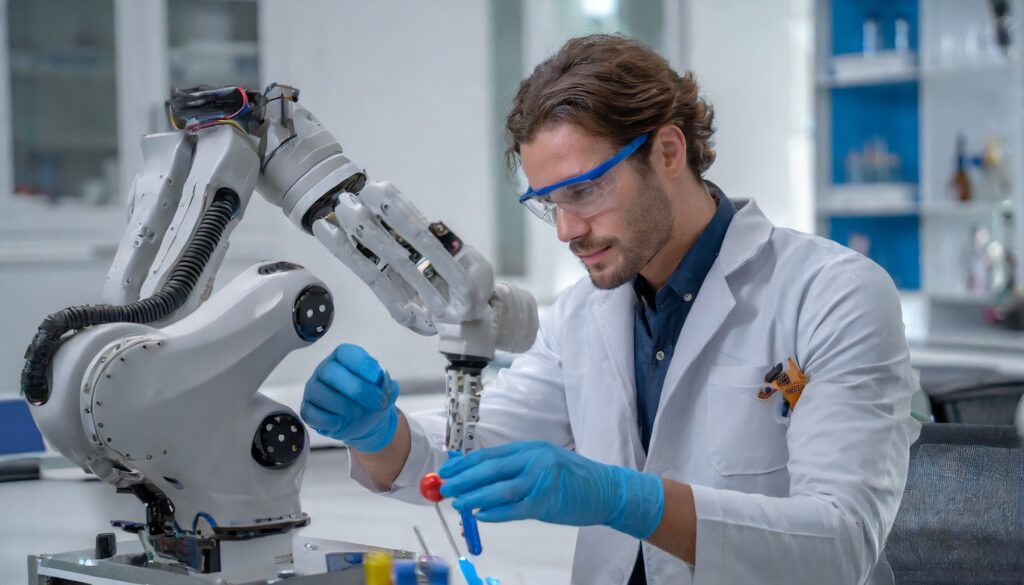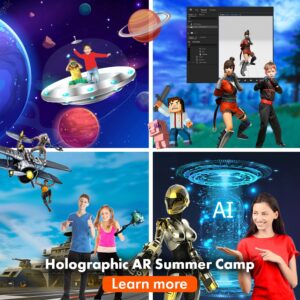
A Sci-Fi Vision Becomes Reality
Imagine a scene straight out of a science fiction movie: a laboratory where robotic arms, guided by an unseen intelligence, mix chemicals with precision, while screens flash with complex molecular structures analyzed faster than any human mind could. This vision, once confined to the realms of movies and novels, is fast becoming a reality in our world, thanks to the rapid advancements in Artificial Intelligence (AI). From chemistry to medicine, AI is not just a futuristic concept but a present-day revolution, reshaping how we understand and interact with the world around us.
AI: A Catalyst in Chemistry and Beyond – Revolutionizing Fields with Real-World Applications
1. Chemistry’s New Frontier: AI as the Modern Alchemist
In the domain of chemistry, AI’s influence is monumental. Consider AI systems like DeepMind’s AlphaFold, which made headlines for solving the complex problem of protein folding. This breakthrough has profound implications for drug discovery and understanding biological processes. AlphaFold’s ability to predict protein structures could lead to the development of new, life-saving medicines in a fraction of the time it once took. Another example is IBM’s RXN for Chemistry, a cloud-based AI platform that predicts the outcomes of chemical reactions. This AI-driven approach accelerates the discovery of new materials and pharmaceuticals, making the AI ‘chemist’ an invaluable asset in modern laboratories.
2. Revolutionizing Chemical Engineering: AI’s Role in Industry
In chemical engineering, AI’s application ranges from process optimization to safety enhancements. Companies like Aspen Technology are leveraging AI to optimize manufacturing processes, ensuring efficiency, resource conservation, and reduced environmental impact. AI algorithms in this field can predict equipment malfunctions, averting potential disasters and maintaining uninterrupted production. For instance, Siemens’ process control systems use AI to monitor and predict equipment performance, leading to safer and more efficient industrial operations.
3. A New Era in Biology: AI Unraveling Genetic Mysteries
Biology has been transformed by AI’s ability to decode vast genetic datasets. An example of AI’s impact is in the field of genomics, where companies like 23andMe use AI to analyze genetic data, providing insights into ancestry and health predispositions. This democratizes access to personalized medicine, making it more effective and accessible. In research, tools like Euretos use AI to understand disease mechanisms, aiding in the discovery of novel therapeutic targets.
4. Biomedical Engineering’s Leap Forward: AI-Powered Innovations
In biomedical engineering, AI is facilitating groundbreaking innovations. A prominent example is the development of AI-powered prosthetics by companies like Össur and Hugh Herr’s Biomechatronics group at MIT. These prosthetics use AI to adapt to the user’s movement patterns, providing a level of comfort and functionality that closely mimics natural limbs. Diagnostic tools have also been revolutionized by AI; for instance, PathAI uses machine learning to assist pathologists in diagnosing diseases from biopsy samples, enhancing accuracy and speed.
5. Transforming Medical Practices: AI’s Impact on Healthcare
The influence of AI in medicine is dramatic and far-reaching. AI’s ability to rapidly analyze medical images is exemplified by companies like Aidoc, which provides AI-powered radiology solutions to help doctors identify critical findings in medical imaging more quickly and accurately. This technology shortens the time for diagnosis and treatment initiation, improving patient outcomes. Another example is Google’s DeepMind Health, which collaborates with hospitals to improve the quality of healthcare delivery through AI research.
How AI is Reshaping Scientific Research with Cutting-Edge Technologies and Partnerships
1. Mastery Over Data: Unleashing the Power of AI in Data Analysis
AI’s extraordinary ability to sift through and make sense of vast data sets is a game-changer in scientific research. Companies like Palantir Technologies are at the forefront of this revolution, providing platforms that analyze complex, large-scale data for various applications, including biomedical research and drug discovery. Their software assists scientists in detecting hidden patterns and correlations, enabling breakthroughs in disease understanding and treatment strategies.
In environmental science, AI-powered platforms like Microsoft’s AI for Earth grant researchers the tools to analyze climate patterns and predict changes with remarkable accuracy. This capability is vital for understanding and combating climate change, leading to more informed decisions and policies.
2. Autonomous Experimentation: AI Elevating the Pace of Scientific Discovery
The capability of AI to autonomously design and conduct experiments is transforming the landscape of scientific research. Companies like Zymergen integrate AI with biology, automating the process of genetic discovery and manipulation. This approach allows for continuous experimentation, vastly speeding up the pace of research and leading to innovative biological products.
In the field of materials science, AI-driven platforms like Citrine Informatics are revolutionizing how new materials are discovered and developed. By automating the experimental process, these platforms can rapidly test and iterate thousands of material compositions, leading to faster development cycles for new materials with desired properties.
3. Synergy with Robotics: Crafting the Labs of the Future
The synergy between AI and robotics is crafting ultra-efficient, highly precise laboratory environments. Companies like Boston Dynamics are at the forefront, developing advanced robots that can navigate and interact with complex environments. These robots, when integrated with AI, can perform intricate tasks in laboratories, from handling hazardous materials to conducting delicate experiments, all with unparalleled precision.
Another player in this field is Thermo Fisher Scientific, which offers automated laboratory solutions that integrate AI and robotics. Their systems streamline lab processes, from sample preparation to data analysis, ensuring consistency and reducing the potential for human error.
Bringing It All Together: The Synergy of AI, Data, and Robotics in Real-World Applications
The integration of AI, massive data analysis capabilities, and robotics is not just a scientific advancement; it’s a revolution in how we approach and solve complex problems. In healthcare, companies like Flatiron Health use AI to analyze clinical data, enhancing cancer research and treatment. In agriculture, Blue River Technology employs AI and robotics to make farming more efficient and sustainable.
These real-world applications of AI in scientific endeavors illustrate a future where AI-driven systems not only assist but also lead in the discovery and creation of innovative solutions. They showcase a world where the boundaries of what’s possible are continually expanding, thanks to the power of AI.
Bringing the Future to Everyday Life: AI’s Role in Transforming Our World
1. Healthcare: Revolutionizing Patient Care with AI Innovations
In the healthcare sector, AI’s impact is profound and far-reaching. Companies like Babylon Health are leveraging AI to provide accessible healthcare services through their app, which offers AI-driven medical consultations. This technology empowers patients with quick, accurate medical advice, reducing the need for in-person visits and making healthcare more accessible, especially in remote areas.
Another groundbreaking application is in diagnostic imaging. For instance, Zebra Medical Vision uses AI to read medical images, aiding in the early detection of diseases like cancer, which significantly improves patient outcomes. This AI-driven approach to diagnostics mirrors the advanced medical technology often depicted in sci-fi films, where a quick scan can reveal a patient’s health status in intricate detail.
2. Environmental Impact: AI as Earth’s Guardian
AI is playing a pivotal role in protecting our environment. Imagine a scenario akin to a sci-fi movie where AI systems monitor the entire planet, predicting environmental changes and disasters. This is not far from reality, as companies like IBM with their AI for the Environment initiative are using AI to monitor climate change and assist in sustainable farming practices.
In energy conservation, Google’s DeepMind has developed AI that optimizes the energy consumption of data centers, significantly reducing their environmental footprint. This application of AI in energy optimization is a crucial step towards building a more sustainable future, reminiscent of eco-friendly technologies often envisioned in futuristic narratives.
3. Education and Accessibility: AI Breaking Educational Barriers
AI’s role in democratizing education mirrors the egalitarian visions of education often seen in utopian sci-fi. Companies like Integem are integrating AI into educational tools, providing personalized learning experiences that adapt to individual student needs. This approach makes learning more effective and accessible, catering to diverse learning styles and capabilities.
Moreover, AI technologies like voice recognition and language processing are being used to assist people with disabilities. For example, tools like Microsoft’s Seeing AI app help visually impaired individuals interact with their surroundings, reading text aloud from books, menus, or street signs. This technology, once a staple of futuristic stories, is now a reality, breaking down barriers and making the world more inclusive.The Ethical Dimensions of AI
With great power comes great responsibility. The burgeoning capabilities of AI necessitate a thoughtful approach to its deployment. We must ensure that AI is used ethically and responsibly, avoiding potential misuse and ensuring its benefits are shared equitably across society.
The Future is Here
As the line between science fiction and reality blurs, AI has transitioned from a futuristic concept to a transformative force in our world. Its applications, from revolutionizing healthcare to pioneering new drug discoveries, exemplify not just technological prowess but a commitment to enhancing human life. AI is reshaping our world, making it safer, healthier, and more equitable.
In this new era, understanding and engaging with AI, robotics, and coding is becoming essential. The future calls for a generation that is not only tech-savvy but also equipped with the skills to navigate and innovate in an AI-driven landscape. This necessity underscores the importance of introducing these concepts early in education, particularly in K-12 settings.
For young minds eager to delve into the realms of healthcare, AI, and robotics, educational programs like Camp Integem present a unique opportunity. This ACS WASC-accredited camp stands out for its holistic approach to learning. It integrates Holographic AR coding, AI, and robotics engineering in a dynamic, hands-on environment. Camp Integem offers more than just technical skills; it’s a place where creativity and innovation are nurtured, allowing students to explore diverse fields from game design to space exploration. The camp’s curriculum is designed to cater to individual learning paces, ensuring that each student can thrive.
With small class sizes, Camp Integem ensures personalized attention, fostering a supportive and interactive learning environment. This approach is pivotal in empowering students with the confidence and skills to pursue future careers in healthcare, technology, and beyond. The camp’s commitment to providing a foundational experience in these rapidly evolving fields is aligned with the educational imperative of our times.
As we embrace this AI-centric future, it’s imperative that educational initiatives like Camp Integem are recognized and valued. They play a critical role in preparing the next generation for the challenges and opportunities that lie ahead in a world where technology and human lives are increasingly intertwined. The visionary future once depicted in sci-fi is unfolding before us, and through such educational endeavors, we ensure that our youth are ready to be active, innovative participants in this exciting journey.




Recent Comments